QCF: WrestleQuest
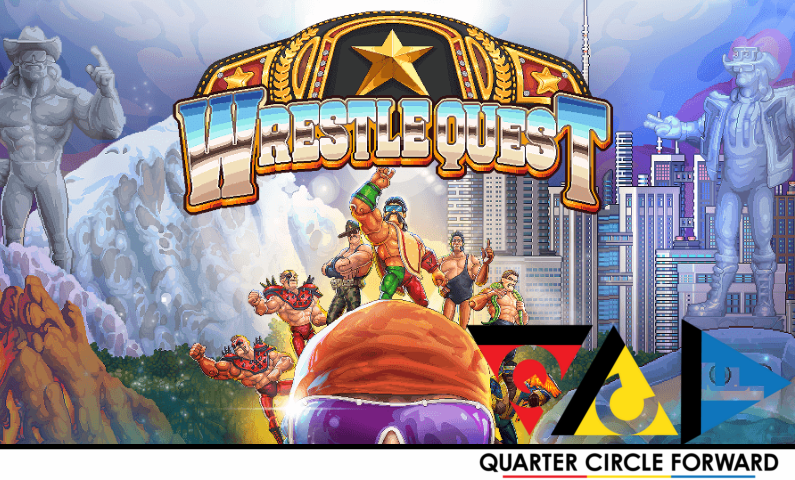
 sn't it weird how, like Video Games, Pro-Wrestling has had its ups and downs within the Pop Culture Zeitgeist? It's just one of those deals where varying degrees of social stigmas through different generations had just held it back from reaching actual relevance within the mainstream consciousness like it's arguably achieved in today's entertainment climate, and that's because it's so much more than just a "sport" to enjoy. Imagine, for example, a Quarterback running a standard play in a Football game, and the moment they shouted "Hike," they suddenly ran backward toward their own endzone, spiked the ball down to the turf, and then viciously ripped their jersey off only to reveal the other team's jersey underneath it—this is the kind of energy you can expect out of Professional Wrestling. There's no other athletic competition out there like it.
sn't it weird how, like Video Games, Pro-Wrestling has had its ups and downs within the Pop Culture Zeitgeist? It's just one of those deals where varying degrees of social stigmas through different generations had just held it back from reaching actual relevance within the mainstream consciousness like it's arguably achieved in today's entertainment climate, and that's because it's so much more than just a "sport" to enjoy. Imagine, for example, a Quarterback running a standard play in a Football game, and the moment they shouted "Hike," they suddenly ran backward toward their own endzone, spiked the ball down to the turf, and then viciously ripped their jersey off only to reveal the other team's jersey underneath it—this is the kind of energy you can expect out of Professional Wrestling. There's no other athletic competition out there like it.
It's a spectacle that's translated very well into the Video Game format, so much so that Wrestling Games are their own little subgenre to play from. Still, it's nearly always a case where developers adapt the rules and conventions of Pro Wrestling into a video game instead of it being the other way around.
Developer Mega Cat Studios pondered that challenge with a JRPG-inspired Turn-based Adventure named WrestleQuest, a colorful fantasy take on the world of Toys and their dreams to make it big in the squared circle. At the core of the concept, any premise can be made into a 16 Bit styled RPG if you have the right systems in place, but WrestleQuest doesn't settle for that and instead delivers one of the finest examples of Ludonarrative Consistency that I have ever experienced. I'm not kidding when I say it's easily one of the best Pro Wrestling games ever released in generations.
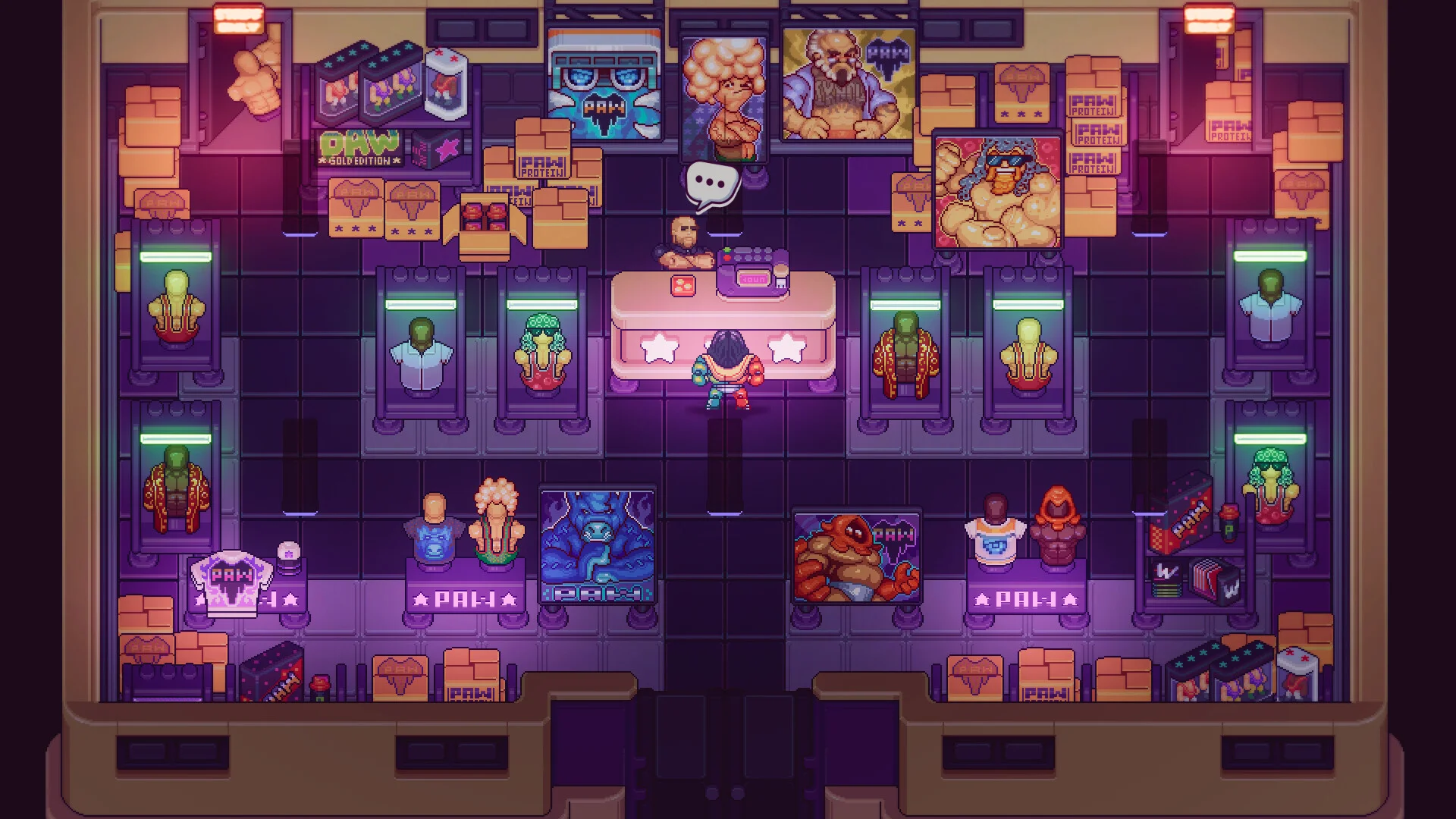
Beyond skill-building and number-crunching, a quality RPG is defined by a story captivating enough to drive a journey through several chapters of adventures and self-discovery. So how does WrestleQuest deliver on such a promise around a theme that's bound to go through several predictable plot points? The answer is so simple that I'm honestly surprised that it's never been explored until now—WrestleQuest places you in the role of two very different characters who each represent both the fantasy, and reality of Pro-Wrestling.
The premise is set within the fictional land of toys, where plushies, action figures, dolls, and other toyetic figurines exist together through different civilizations that share a reverence for the pastime of Pro Wrestling. Ranging from plastic to polyesters, every society of toys have deified various legends of the sport like Macho Man Randy Savage, The Junkyard Dog, The Road Warriors, and many more like cultural prophets, emulating their personality and trademark gimmicks into their regional customs and policies. The unique venerations the natives have for their spandexed messiah will all come into conflict with the viewpoints of the two heroes, and this is where the narrative of WrestleQuest really cooks. Players will be first introduced to Muchacho Man, a diehard mark for the business of professional Wrestling, so much so that the concept of kayfabe (the term that rationalizes the scripted nature of the Wrestling spectacle) is completely lost on him, because really is real to him dammit. Meanwhile, the other hero of our quest, Brink Logan, has fully embraced the "behind-the-scenes" operation of Wrestling and works towards his aspiration of grandeurs with an insider perspective instead of Muchacho's devotion to the surface of its pageantry.
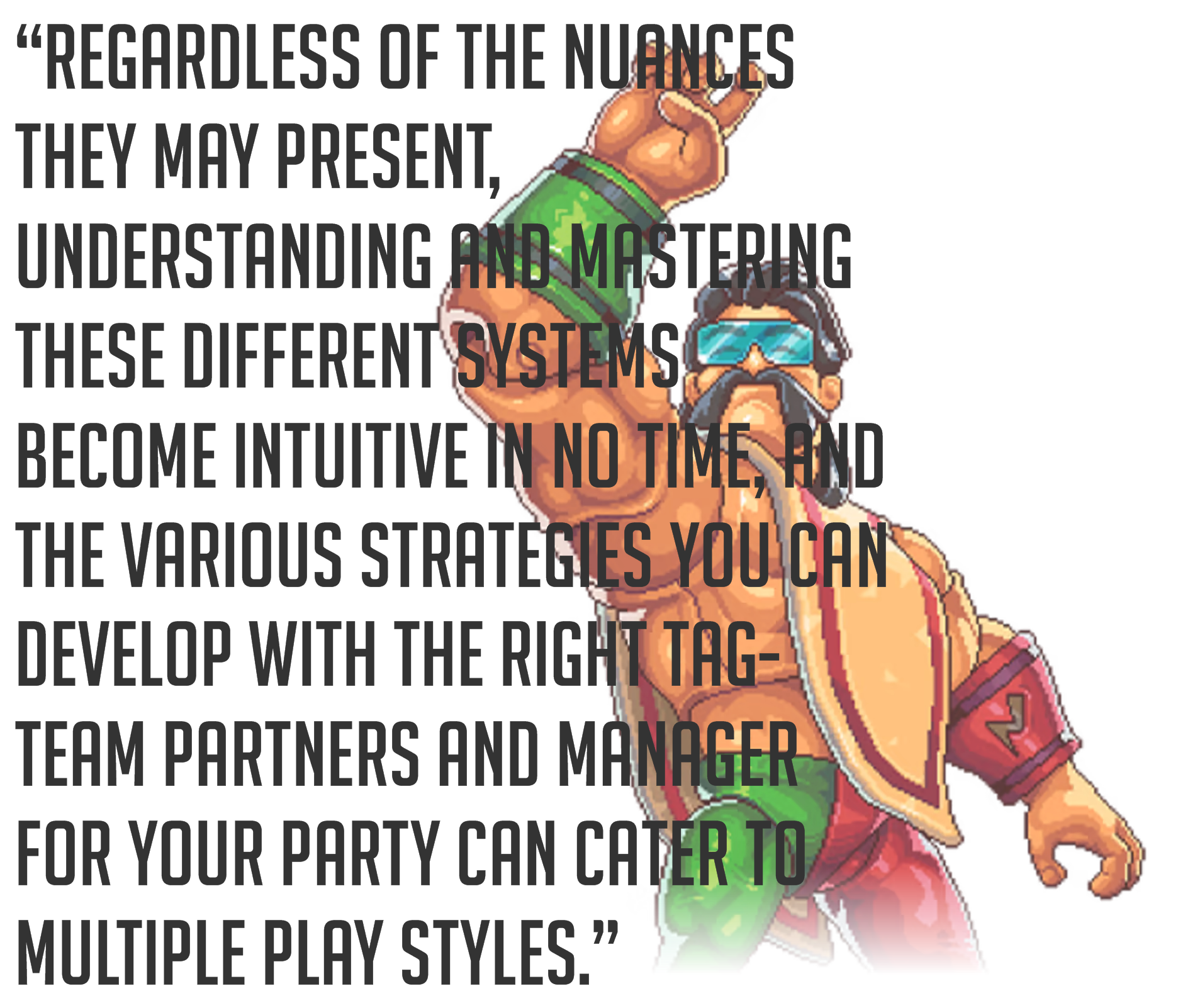 While this plot design would never have flown in the past, given the intensive measures most major Wrestling promotions took towards guarding the orchestrated plans of their weekly contests, the backstage planning of the Wrestling business is much more of an open secret that fans are aware of, and go along with, in an effort to buy into the athletic drama the combat sport is iconic for telling. Implementing this element of wrestling into the overarching story and the development of how the quote-unquote "script" can affect the course of their actions works on so many more layers, doing more to ingratiate players into the inner workings of Professional Wrestling than simply just offering them the "stageplay" of the concept and nothing more.
While this plot design would never have flown in the past, given the intensive measures most major Wrestling promotions took towards guarding the orchestrated plans of their weekly contests, the backstage planning of the Wrestling business is much more of an open secret that fans are aware of, and go along with, in an effort to buy into the athletic drama the combat sport is iconic for telling. Implementing this element of wrestling into the overarching story and the development of how the quote-unquote "script" can affect the course of their actions works on so many more layers, doing more to ingratiate players into the inner workings of Professional Wrestling than simply just offering them the "stageplay" of the concept and nothing more.
Although the game can throw around a bit too many insider terms or references that'll be lost on those with a cursory understanding of the sport, the writing and dialogue is more than strong enough to carry players through these fan-service moments. There are a slew of other Pop-Culture references that are offered, woven through a ton of witticisms and viewpoints that will attach you to the real personality that WrestleQuest's characters try so hard to hide under their High-Flying personas.
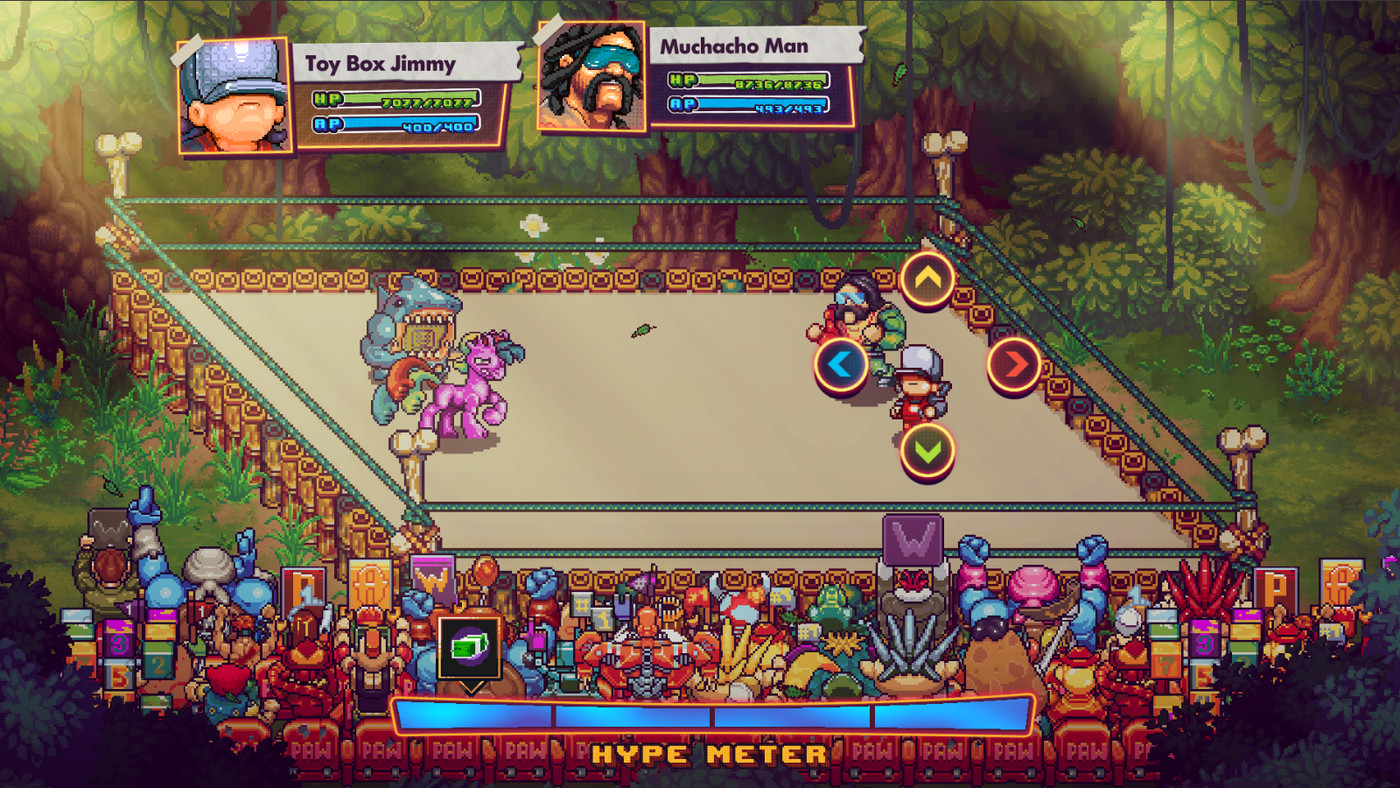
World-building aside, though, the big question on your minds is how the gameplay stacks up to the big claim I made at the start of this review, right? How does WrestleQuest capture the peaks and valleys of a wrestling match when your grappled maneuvers are all chosen from a series of menus—Well, through the blend of Active-Time Battle mechanics and dynamic combat mechanics, the battle system behind this ambitious RPG is just as energetic as an exhibition match on No Mercy for the N64.
The same level of care that was put into the presentation of WrestleQuest has also gone into the combat setup. Every enemy encounter smacks you at the opposite corner of the ring with your opponents, where players will have access to basic strikes, gimmick maneuvers, items, or enhanced guarding; each action is complimented with additional QTE prompts and like any Wrestling Match, playing to the crowd is the secret to success.
Similar to the audience mechanic from Paper Mario: The Thousand-year Door, successfully landing these additional timed inputs to your tactics can not only give extra advantages to attacking or defending, but they can also quickly build up your hype, adding to the fame meter, a status bar that brings a slew of modifiers/conditions that can aid, or hamper your odds of winning the match. How you manage the fluctuation of your fame will also depend on what moves are used to add or detract from the impression you make with the "fans" in attendance. Rallying a popped crowd can lead you to combat bonuses like reduced damage, reduced AP for your Gimmick use, or increased payout for cash and experience points, all of which can make a significant difference in and out of battle.
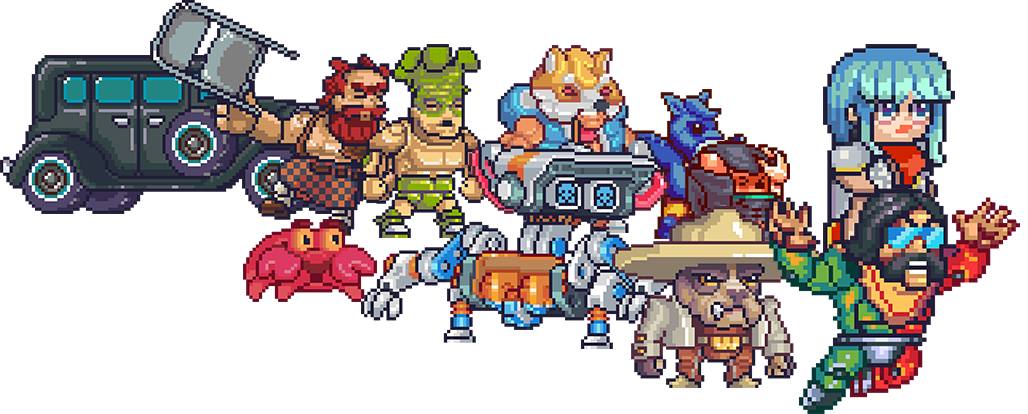
The QTEs themselves also lend to the pace of an actual wrestling match, and the various counters that can happen, like striking an opponent into the ropes can bounce them back for a follow-up combo bash to 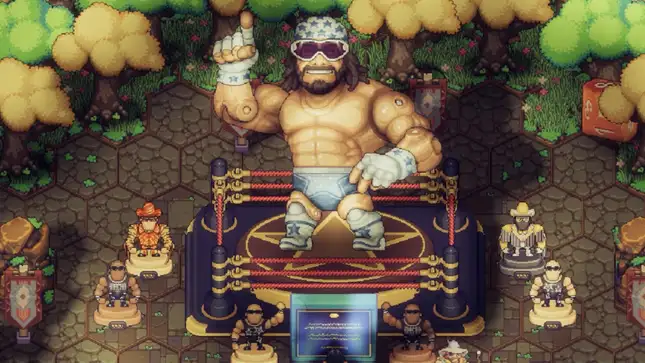 increase the overall damage of your attack. The scenario can be reversed, opening a window to counter a powerful strike from your adversary after rebounding from the ropes yourself. Some enemies aren't even bested without properly pinning their shoulders to the mat for a 3-count, leading to a short window of button prompts needed to conquer your enemy or at worst, kick out of an attempt to roll up one of your allies for a victory.
increase the overall damage of your attack. The scenario can be reversed, opening a window to counter a powerful strike from your adversary after rebounding from the ropes yourself. Some enemies aren't even bested without properly pinning their shoulders to the mat for a 3-count, leading to a short window of button prompts needed to conquer your enemy or at worst, kick out of an attempt to roll up one of your allies for a victory.
These details are just the tip of the battle system; all of the gameplay mechanics for combat work to seamlessly blend the conventions of JRPG Turn-based combat with Professional Wrestling and execution that works to benefit both worlds.
Regardless of the nuances they may present, understanding and mastering these different systems become intuitive in no time, and the various strategies you can develop with the right tag-team partners and Manager for your party can cater to multiple play styles.
The labor of love that went into the production of this game can also be seen from all of the star power featured in the game, with dozens of licensed talent that span decades of history within Pro Wrestling. We're talking the likes of Diamond Dallas Page, "Double J" Jeff Jarrett, Conrad Thompson, and even other faces in the industry like Dave Meltzer and Bryan Alvarez of the Wrestling Observer—it really can't be stated enough just how much this title exudes a "by the fans, for the fans" energy in all of the right ways.
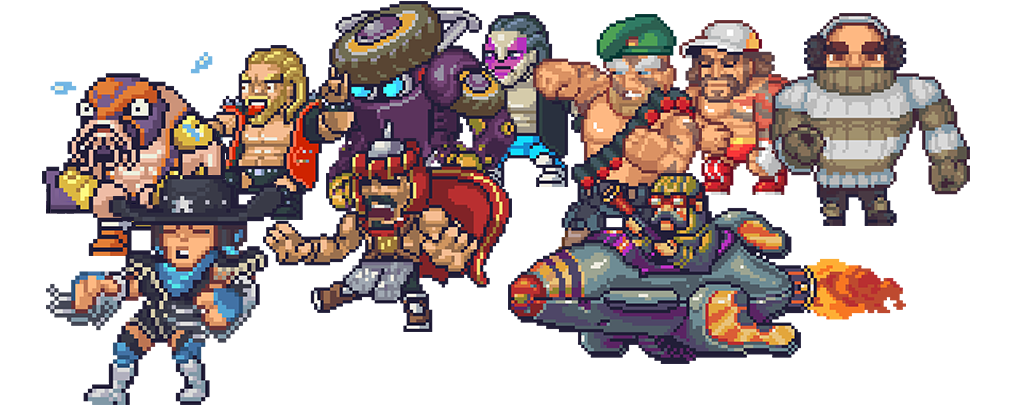
If there was one gripe about the game, it would definitely be the soundtrack. Despite the engaging sound design behind the character quips or slams in the ring, the musical score is just kind of, there by comparison. There aren't any real memorable tracks or tunes that stuck with me, which was especially a bummer for the entrance sequences that took place before big matchups, one of the most critical factors in building excitement around a Pro Wrestling clash. Fortunately, the visuals are outstanding, with fine line styled Pixel Art that's reminiscent of Paul Robertson's work, but still being distinctive enough in its own right with dense details in every character and environment on screen that gives the hook of a "wrestling-obsessed toy world come to life" a true sense of vibrance to everything on display.
Despite releasing alongside big RPG Bombshells like Final Fantasy XVI and Baldur's Gate 3, Mega Cat Studios managed to offer something really special with WrestleQuest that shouldn't be missed by anyone looking for a Role-Play experience to sink their teeth into, especially when where you can meet Bret the Hitman Hart. Slam it into whatever the hell you play your modern games on, and get ready to feel like a kid staying up late at night again with this unforgettable gem of a title.
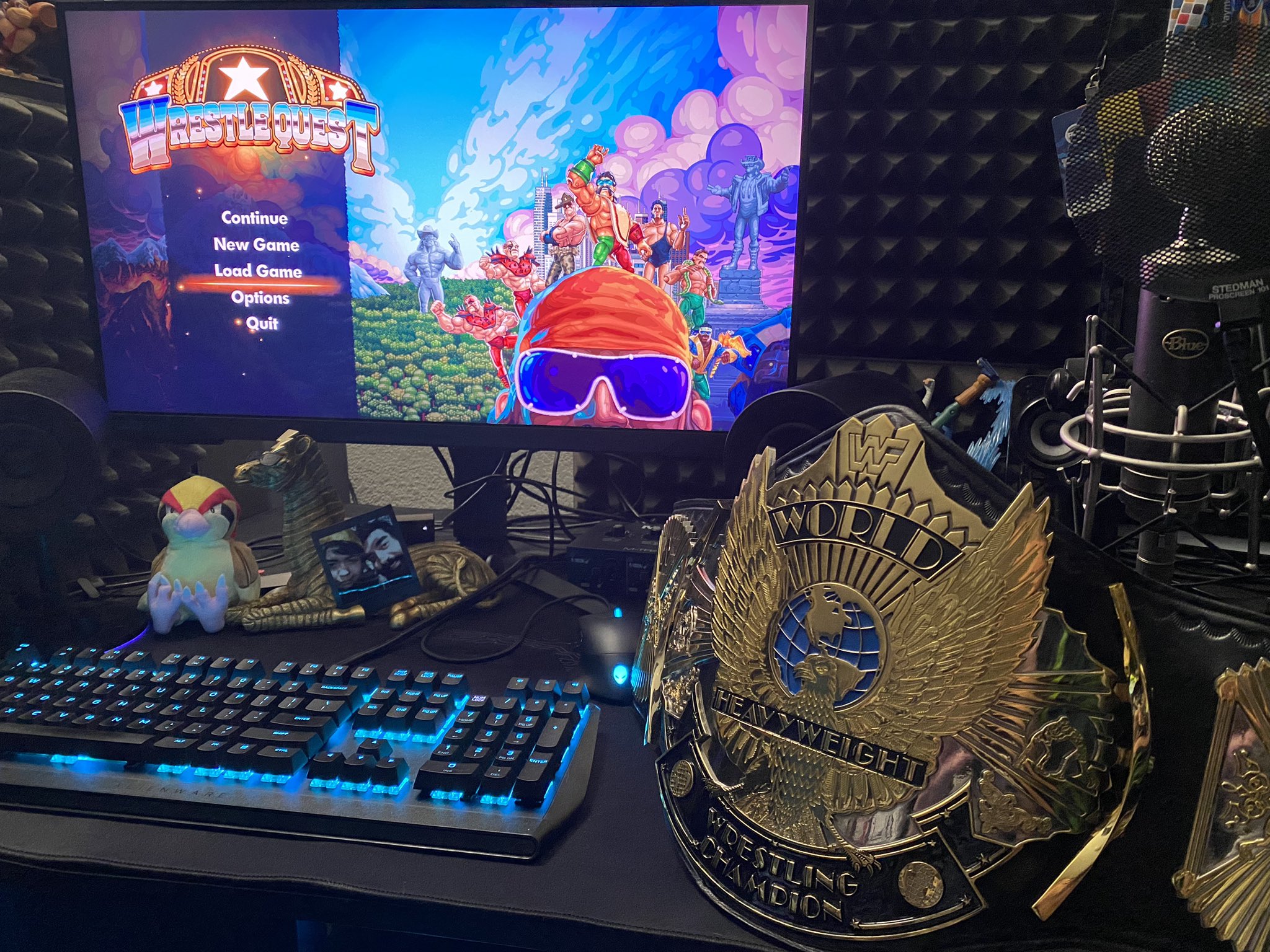




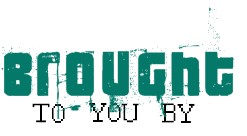
 GeorgieBoysAXE
GeorgieBoysAXE




